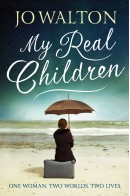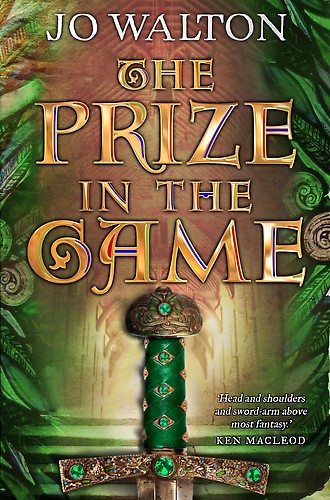When I was a child, I bought The Cave by Richard Church from a jumble sale for 10p. It was a paperback with a blue cover that showed a boy with a torch (flashlight) whose weak beam illuminated a few feet of cave. On the back cover it said words to the effect of “In The Cave some kids get lost in a cave and have an adventure. But that isn’t the good part. The good part is that the kids grow and develop and change because of this adventure.”
I was nine, I think, and I’d recently read the complete works of Nicholas Fisk as they existed in the school library, which included not only the well known and totally excellent (if you happen to be nine) Space Hostages but also High Way Home which is about some kids having an adventure in a balloon, except that that isn’t the good part, the good part is that the kids grow and change, and at the end when they are safe and rescued the hero feels flat and miserable, and his father says to him, in words that should be right up there with “Et haec olim meminisse iuvabit” (and in fact now I come to think about it are “et haec olim…”) that when he, the father, came back from fighting in WWII he felt “As happy as you are now” and the kid understands what that means, and so did I.
Nicholas Fisk’s characters are cardboard, delineated with the minimum necessary broad strokes, and his plots are fast and exciting, and yet he managed to use them to demonstrate a basic human truth.
Richard Church, however, didn’t. I could tell the difference. I remember thinking about it, looking at that blue torch-lit cover of the book I owned and thinking about High Way Home which the school library had bought essentially for me because it was Fisk’s new book, but I still had to give it back so I didn’t have it at that moment. I couldn’t articulate the difference between these two real world adventure stories, but I could certainly see it.
Richard Church tried so damn hard and stopped the story so damn often to tell me what the characters were learning from their experience, and he didn’t have enough about their actual experience and he had way too much analysis of what it Meant. He tried so hard that he let it get in the way of telling the story. Character development should happen in the story, not just on the same page with the story. I got totally disgusted with Church and put him on my list of Authors To Avoid.
(Incidentally, talking about Authors To Avoid, a year or so after this when staying with my Auntie Flo in Hastings, her daugher Judy offered me a Malcolm Saville book. I declined it on the grounds that I had read other Savilles and not liked them. “In this house,” she said, drawing herself up, “We don’t take any notice of the name of the author.” The only difference between their house and our house, as far as I knew, was that they were Catholics. I, who already held taking notice of author names as an article of faith, took this for a piece of Catholic doctrine, and for years believed that this was one of Luther’s 99 Theses, and one I could really get behind. I sometimes think about this when people talk about members of minorities being ambassadors for the whole group. I generalised my cousin Judy’s personal idiocy into something that could actually justify religious persecution.)
But anyway, Richard Church was trying too hard and overloading his story. This kind of thing is, or anyway was, a fairly common fault of children’s books.
In a separate but related point, there was a whole category of children’s books written in the twentieth century which I defined as “books about Ireland” and refused to read. (It is in fact possible to write a book about Ireland without trying too hard; Ian McDonald has done it twice.) The books I rejected weren’t necessarily about Ireland specifically, what they were about was “issues”. They were just starting to be around when I was just getting too old for them, there are a lot more of them out there now. “Issues” overload a story even more than trying to be significant about character development does.
When I came to read adult SF at a hundred miles an hour a few years later, I was glad to learn that trying too hard at character development didn’t seem to exist. If you were good at characters (Ursula Le Guin, John Brunner, Roger Zelazny) you did good characters, if not, you put in ciphers and got on with the story as fast as you could. This, at twelve, was perfectly acceptable to me, and to be honest, it still is. If you give me a lot of ideas and the smell of alien planets, the characters can be as flat as you like, they’re not what it’s about anyway. I would, then and now, rather have characters if they’re available, but if they’re not, I can live with that.
In recent years, I’ve come across SF that’s trying too hard on this front.
I think the first one I read was Greg Bear’s Moving Mars. I read it several years ago, and I retain fond memories of the science and the amazing SFnal end. I haven’t re-read it because I retain less fond memories of a female central character with traumas that went on and on. Then I read Janine Ellen Young’s The Bridge, which unlike Moving Mars is a book that would be much less tedious to read if she hadn’t given the characters long complicated back-stories of child abuse that needs to be overcome. The actual first contact story might well have been OK if it hadn’t been trying to do so much else character-wise that just wasn’t necessary.
I recently read Nancy Kress’s Crossfire. I like Kress, generally, though she’s one of those people like John Varley where I always think her short fiction is absolutely terrific while the novels are more hit and miss. Crossfire though, is a traditional old fashioned SF story that ought to work because it ought to move fast. I ought to love it. It starts off with a ship full of people and their stuff going off to colonize an alien planet. (I love that scenario so much that Ken and I used to run it at Eastercon every year for years.) I shouldn’t care that the science if iffy and the aliens are cliched — and in fact, I wouldn’t care about those things at all, if it wasn’t for the fact that the story gets slowed way down to give the characters depth they don’t need for their jobs in the story, depth which feels fake, which feels like set up for plot, which it is, but which when it then happens doesn’t feel real.
All three of these books would have been better reading experiences for me with cardboard characters.
One of the things people don’t talk about often enough is pacing. (In compensation, I expect I talk about it too much.) Plot is what happens, and story, as Teresa Nielsen Hayden puts it, is a force of nature, and pacing is what keeps everything happening at the right speed for the story. Whatever your particular story is, there’s a pace at which things need to happen, and if you mess that up it’s not the plot that doesn’t work, the plot can work like clockwork, it’s the story. The backstory of the characters, the character interactions, the politics and relevance, the world, everything needs to be inclued the right amount at the right time. If anything gets overloaded, the pacing starts to tilt, and you can end up with a story getting derailed. If you’re stopping the story anything, there’s a problem. You should never need to stop a story for the characters. and I react to that in exactly the same way I reacted to The Cave. (If you’re stopping the story for the issues, I react to that the way I reacted to those books about Ireland.)
I keep wanting to give examples, but every time I think of one, I think of ways it could be made to work, if someone wrote it right. You need to be very good to do that sort of thing right, and maybe the problem is people trying things that are beyond them. It would be hard to say to people “if you’re not good at characters don’t try”, because you can’t get better if you don’t try, and books with characters are indeed better than books without. You just can’t stop the story to do the characters. The characters have to be the story. (Nancy Kress anyway has written some wonderful characters in the past.)
What I want to say is much more what I would have wanted to say to Mr Church when I was nine and sat there staring at the cover of that disappointing book: “Stop trying so hard. Just tell the story and if there’s a point, don’t you make it, let the story make it for you.”




